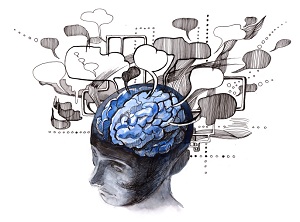Theory
 In science, including psychology, a theory is a principle or idea that explains or solves a problem. Theories typically address a collection of issues. The theory of evolution, for example, is a general theory that helps to explain where humans came from, the relationships between species, and the changes in species over time.
In science, including psychology, a theory is a principle or idea that explains or solves a problem. Theories typically address a collection of issues. The theory of evolution, for example, is a general theory that helps to explain where humans came from, the relationships between species, and the changes in species over time.
Scientific vs. Colloquial Usage
In everyday usage, the term theory is often used to apply to an unsupported claim. For example, a parent might say to her child in the morning, “My theory is that you snuck out last night.” This can create confusion about the meaning of the term when used in science. Scientific theories are ideas that have been heavily backed by a collection of empirical research. Many people are confused about why scientific theories are called theories instead of facts or laws. The difference is simple: scientific laws explain and categorize a particular phenomenon. For example, Kepler’s Laws of Planetary Motion explain how planets move around the sun. Theories, by contrast, explain why something happens and often synthesize several different laws and collections of research. Many widely accepted ideas about human psychology and behavior are theories.
Role In Psychology
Because psychology often deals with abstract phenomena and thoughts, most “facts” in psychology are theories because it is impossible to develop scientific laws about behavior and similar psychological issues. Concepts that rise to the level of theory in psychology have been heavily documented and theories meet a critical test of scientific validity. Sigmund Freud’s concept of the ego is not a theory because it cannot be scientifically tested. Many concepts in psychology have been so heavily documented, however, that they rise to the level of theory. A few examples of psychology theories include:
- Attachment Theory – The idea that early attachments affect future life, that there are particular windows during which attachments are easiest to form and the study of these attachments.
- Behaviorism – The theory that everything that living organisms do can be altered by the environment.
Theories change frequently in psychology based upon new evidence. While this can seem unscientific, most bodies of scientific research change based upon new evidence. This is a critical difference between science and non-science.
References:
- American Psychological Association. APA concise dictionary of psychology. Washington, DC: American Psychological Association, 2009. Print.
- Evolution is not just a theory. (n.d.). Not Just a Theory. Retrieved from http://www.notjustatheory.com/
Last Updated: 08-28-2015
- 2 comments
- Leave a Comment
sabeh seyfu
December 22nd, 2019 at 6:27 AMi want to know about those theory please send for me by email
Brian
January 15th, 2022 at 1:04 PMPsychology is not science. Science requires reproducible experimentation.
Leave a Comment
By commenting you acknowledge acceptance of GoodTherapy.org's Terms and Conditions of Use.



